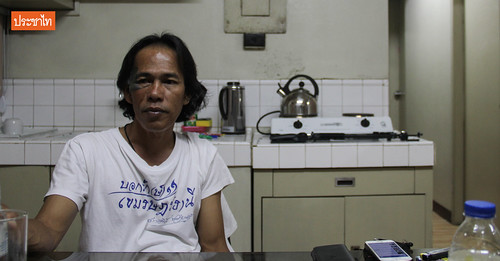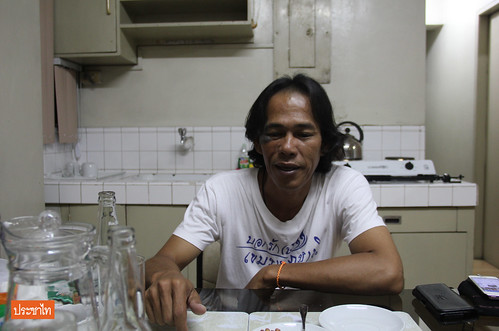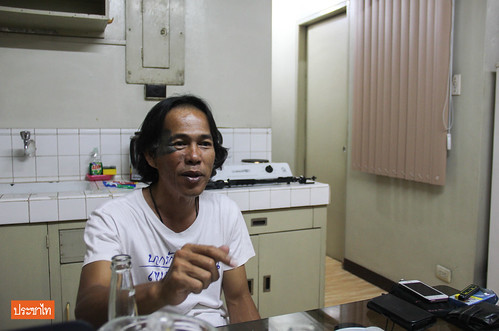An activist with the Assembly of the Poor on the issue of the Pak Mun Dam, Kritsakorn Silarak has been summoned to military bases 18 times. Kritsakorn spoke of the experience of his mother and coworker throwing their telephones in frustration with military pressure.
Summonses to a military base for "attitude adjustment" have been used as a regular tool of the National Committee for Peace and Order (NCPO) since seizing power, but probably no one else has been summoned for talks so very many times.
Kritsakorn Silarak, Assembly of the Poor consultant on the Pak Mun Dam, has for long been involved in public life and has for long been a target for legal cases and of state officials. The present regime has summoned him to military bases 18 times. He has also been twice accused of defamation, in the private sector and by the Ubon Ratchathani Administration, in reaction to his activism.
Kritsakorn Silarak
Prachatai spoke with Kritsakorn about his life, feelings and thoughts, his conversations with military personnel, fears, pressure on his work, and his perceptions of popular movements and life under a military government that has summoned thousands. Just as the Pak Mun Dam gates are closed prematurely, the gates of Thai democracy are open for a while then closed at the whims of the government.
Why have you been summoned so many times?
Because of my involvement with local popular movements, especially with the people of Pak Mun. The movement didn't begin with the coup d'état but has been very active since the Abhisit Vejjajiva and Yingluck Shinawatra administrations. In Abhisit's time, we blocked the railway. In Yingluck's time, we blocked the railway. You can't count the number of times we've rallied at Government House. We have engaged in such actions regularly.
Following the coup, the military flexed its muscles by forcing Thai PBS commentator Khun Nattaya (Wawweerakup) off her program. We saw this as an excessive restriction of freedoms. Not just infringement, but intimidation crushing personal freedoms. We issued a statement asking why, and I was invited for attitude adjustment. I only later understood how serious this was when I was asked to close down my Facebook account. I closed my page but refused to close our community page.
The Assembly of the Poor, Pak Mun Dam holds rallies every year, for example in April and on the International Day of Action for Rivers and Against Dams. The Junta forbids these actions every year, but we cannot stop. Every year the soldiers call me in for "talks" and tell me not to hold the event, but I can't stop what has been a tradition for over 20 years. This is a major annual event running from April through June calling for the dam gates to be opened. The activities include sustained demonstrations that can only be stopped by opening the dam gates. Every time there is a rally or plans for a rally, the military forbids it, and every time we tell them that we must go forward because it's part of the local way of life.
Overall, I've been summoned for these "conversations" 18 times, sometimes as an individual and sometimes with village leaders, but I've only actually reported 11 times. They have to understand that I work for a living and have many duties. When they summon me, I can't always go on the designated day. I can't help it if I have obligations. My principal commitments involve work with the villagers. I have to take care of my own commitments first.
Why didn't you report on the other seven occasions?
The summonses have come in three forms. First, military, police and administrative officials come looking for me—but I'm not always there, and they don't find me. Second, they issue a written summons, hand-delivered by soldiers. Third, noticing me through administrative or police channels.
The reason I only reported 11 times is that sometimes when I informed them that we would hold a rally in three days, they told me to report tomorrow. I say I can't because I have work to do, but will come in later when I finish my work. Then when I'm able to report, they just say never mind. When I did report, it was never at the appointed time because I have to take care of my own obligations first. Even the court's appointment, if it is not convenient, you can ask for a delay. If an appointed meeting with the military is inconvenient, I can delay the meeting as well. That's just a general principle. If you're free, but I'm not, it can't be helped. When my work is done, and it's convenient, I'll go. That's how I handle it. The military officer is not higher than the court. Work is planned in advance, and the military can't just come in and dictate appointments.
What was the most common reason for a summons?
Seventy-five percent of the time it was over Facebook posts, coming from both the Army and the Air Force. The second most common reason has been reason has been actions publicly announced on Facebook The third has to do with personnel changes, say of an administrator or commander, just calling me in to meet the new officials and nothing else.
How have the last three years affected your family and friends?
At first, if my mother didn't insist that I report, I wouldn't go. But they were monitoring us and began to pressure Mother to make me go. So I had to go. That wasn't right. Otherwise, I wouldn't have gone, but they forced Mother to phone me. That way of doing things is brutal. They went to the house and Mother said she doesn't know my number, she can't remember. They didn't believe her and forced her to look up the number on her phone. She resisted and in the end threw the phone against the wall. The phone was wrecked, and they couldn't retrieve the number.
Another time, the soldiers came for me at the office. I had gone out to eat and to work outside the office. I had told the guard that if the soldiers came for me just tell them I wasn't there, that I was out in the field; I was in fact out in the field. I told him that if the soldiers asked for my number, don't give it to them. The soldiers intimidated him until he refused outright saying that I am his boss and he might lose his job if he gave them the number. In the end, he threw his phone against the wall. Luckily the phone wasn't expensive; it only cost five or six hundred.
When you did report, what happened at the base?
They made a memorandum of understanding not to get involved in politics, for example by expressing political opinions, engaging in political discussions, participating in academic political forums, organising and leading. Second, not to engage in any movement activities violating NCPO orders. There were four or five items. Another one was not to leave the Kingdom without permission from the NCPO. Things I have never observed.
Have you experienced changes in military personnel since you were first summoned?
Over the past three years, there have been two Commanders of the Military Circle. The first was quite heavy-handed and every summons was enforced. One time, [the first Commander] summoned a village leader and had the District Deputy Head fetch the man at home and drive him to the Army base; but he brought the wrong man. Enforcement was very heavy in 2014 and 2015.
Things were a little better in 2016 and 2017. Written summonses were issued in advance. Soldiers would come around later, without fanfare; two or three policemen might come, but not as a joint force. Things were not nearly as harsh or as rigid. At the military camp, they were rather respectful as the new personnel engaged in discussion and exchange of information rather than intimidation like before. We spoke with every section: the Command Group, the Control Group, the Chief of Staff Group and the Judge Advocate Group in addition to Security and the Police.
How much did the coup d'état affect your work?
There were many changes. For one thing, work became more difficult and complicated in that we had to explain everything to the military. Such explanations did not enhance our effectiveness or help to resolve problems, but I had no choice but to comply. Never at these sessions did the military say anything about solving the villagers' problems. They instead said that this government wants calm and social order. Calm and order means don't do anything, no movements.
Second, in the past, no government interfered with my private life. This administration has been terrible. They've harassed my family; especially my mother. I can't accept that. If the military doesn't agree with the movement, they should talk to movement people. The first time the soldiers came looking for me, they went to seven different places, including my house. Over about 20 officers, soldiers, police and security, went to the house. They didn't know where my house was so they had the sub-district head take them. The sub-district head didn't know the way, so he went looking for the village head. As it happened, he couldn't find him. The sub-district head then called for the village head over the public address system. The village head was out in the fields harvesting rice, and the whole village turned out to see what the hullabaloo was all about. Just awful!
Beyond that, they've intimidated the villagers and my co-workers. They approach the villagers, the leaders and their families, telling them that my activities violate NCPO orders. That has caused many problems including anxiety among the families of the leaders. That's not right.
What has been the worst?
Twice we travelled to Government House with only about 20 villagers to request a meeting with officials; they told us to submit our concerns to the Justice Center. We didn't do that because we hadn't come to file a complaint but to pursue our cause. We sat and waited directly in front of the door. A large contingent of soldiers arrived. The villagers continued seated but the soldiers didn't dare do anything to us.
Another time, in Ubon, about 30 villagers said they would rally. But the military turned out a security force of five or six hundred soldiers. Such a show of force against 30 villagers made the news reporters laugh.
In what ways do the summonses play out?
I've been summoned by the Army at Army Base 22, the Air Force at Air Base 21 and the Navy securing the border at the Mekong River. I've already said what it was like with the Army. With the Air Force, Minister Panadda (Diskul) once came to Ubon in connection with Pak Mun. We requested a meeting with him, saying that he cannot refuse to meet with the villagers. We asked where we could meet with him. The Ubon airport has only one entrance; if we went to meet him there that might block off the airport and we asked what the officials would do. As a result of these questions, I was summoned by the Air Force.
In 2016 there was a law against fishing during spawning season. That had never been forbidden before in this area. We felt that we couldn't accept that and I posted a threat on Facebook to stream video of them arresting villagers on Facebook Live. I went to a coffee shop in Khong Chiam. My custom there was just to take pictures, drink coffee and look at Facebook. After only five minutes, some sailors came and told me I had to go the next day to meet the commander. I asked for a delay as I was not free. A delay would allow me to engage a lawyer and inform my co-workers. I then posted on Facebook that we would report in the afternoon three days hence. When the time came, I drove to the Navy headquarters with a rights lawyer, but the sailors said that the commander would only receive me at 7 PM. We left, saying that seven in the evening is outside working hours; it’s not convenient and we work hard and need to rest. If the commander wants to meet, I said, he can let me know through Facebook. Then we just went for an afternoon snack and returned home. They didn't contact me again, and I never did meet with the commander.
Most of the summonses don't allow for preparation. They call for me to report the very next day. They never give me three days notice. That's not acceptable. I have work. I have obligations. That kind of summons is simply wrong. Even the court gives 15 or seven days, and further delays can be requested. I don't refuse the summonses, but doing it this way... It's not convenient, and I'll report later.
Why do the villagers continue in spite of the intimidation?
The movement didn't just now get started. We have faced threats since before the current military government, since 1991 when it began. Then, we couldn't tell one opponent from another—investors, the private sector, gunmen threatened us. It was much worse than now and we grew. Having been through the worst, the situation doesn't discourage the villagers at all. They've been fighting for 27 years, calling for justice, and as long as justice is not realised they will continue. There is no other way to make them stop.
Besides imposing authority through the military, they are using legal means, such as filing false accusations of violating the Referendum Act and defamation lawsuits. These devices will not impede our movement.
The original article in Thai is available here
Translation by Stephen A. Evans



